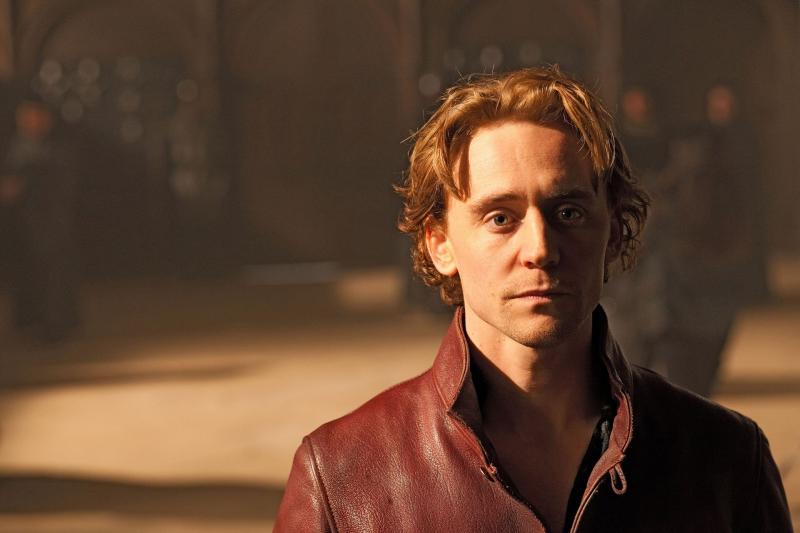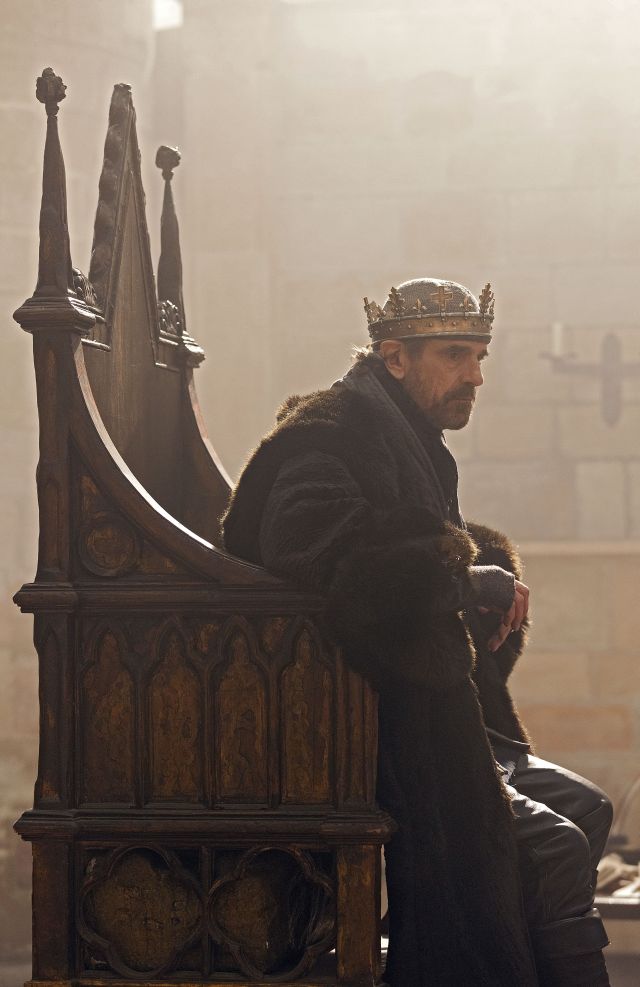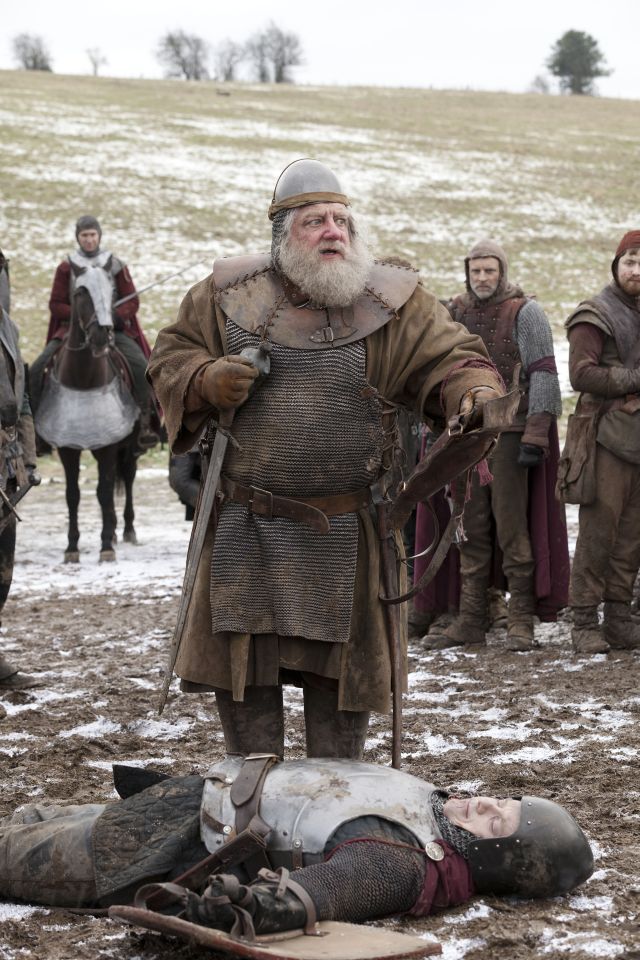The Hollow Crown: Henry IV Part 1, BBC Two | reviews, news & interviews
The Hollow Crown: Henry IV Part 1, BBC Two
The Hollow Crown: Henry IV Part 1, BBC Two
The second instalment of the BBC's celluloid Shakespeare is fit for the cinema

Now we're talking! Following on from a small-screen Richard II of greater aural than visual interest, along comes Richard Eyre's TV adaptation of both Henry IV plays, and the first thing that seems evident about Part One is how well it would hold up in the cinema.
 As with Rupert Goold's Richard II, the Henry IV ensemble constitutes a veritable thespian who's who, many of whom one can imagine returning to these same parts on stage, Simon Russell Beale as Falstaff most especially. (One wonders whether Jeremy Irons, pictured right and on tremendous form as an ageing King Henry here shown to be unusually prone to violence, would accept what is essentially a supporting role in the theatre.) The material, of course, is televisual catnip, shifting from the muddy Cheapside streets of the ale house to the corridors of power walked by Irons's stern-faced, ever-admonitory monarch. But in collaboration with a cameraman in Ben Smithard (My Week With Marilyn) doing career-best work, Eyre allies the verbal landscape of the play to a painterly study in love and loss moving inexorably onward to life and death: when Falstaff and Hal (Tom Hiddleston) play-act the banishment that will go on to be enacted for real, Eyre's probing lens amplifies the eerie sense of foreboding that exists in the text.
As with Rupert Goold's Richard II, the Henry IV ensemble constitutes a veritable thespian who's who, many of whom one can imagine returning to these same parts on stage, Simon Russell Beale as Falstaff most especially. (One wonders whether Jeremy Irons, pictured right and on tremendous form as an ageing King Henry here shown to be unusually prone to violence, would accept what is essentially a supporting role in the theatre.) The material, of course, is televisual catnip, shifting from the muddy Cheapside streets of the ale house to the corridors of power walked by Irons's stern-faced, ever-admonitory monarch. But in collaboration with a cameraman in Ben Smithard (My Week With Marilyn) doing career-best work, Eyre allies the verbal landscape of the play to a painterly study in love and loss moving inexorably onward to life and death: when Falstaff and Hal (Tom Hiddleston) play-act the banishment that will go on to be enacted for real, Eyre's probing lens amplifies the eerie sense of foreboding that exists in the text.
It's the great good luck of the British theatre to offer up so many young actors who can readily navigate the demands of film, as well: Ben Whishaw proved as much last week, playing the self-poeticising yet doomed Richard, and Hiddleston turns out to be to the stature and manners born as this film's Henry V-in-waiting. His innate charisma aptly suited to the role of the "King's son" that the Hal of Part One has to be reminded he is, Hiddleston possesses an unshowy glamour that can be playful or not, as required. One smiles with him as he looks on fondly at Russell Beale's bulbous-nosed Falstaff, even as one is equally aware that such camaraderie cannot last.
 A longtime regular of the National Theatre that Eyre used to run, the emotionally and physically capacious actor (pictured left) lets slip the occasional trademark gesture, though not as many as Julie Walters, who can't entirely submit her own persona to the earthy requirements of Mistress Quickly. But where Russell Beale really scores is with the occasional sad-eyed glance indicating an awareness that Falstaff's game may one day be up, and that so flouncy and extravagant a figure is equally marked out by a capacity for cowardice and the craven. (At the genial Q&A after the screening, the creatives were quick to deride most of the principals in the play as "shits".)
A longtime regular of the National Theatre that Eyre used to run, the emotionally and physically capacious actor (pictured left) lets slip the occasional trademark gesture, though not as many as Julie Walters, who can't entirely submit her own persona to the earthy requirements of Mistress Quickly. But where Russell Beale really scores is with the occasional sad-eyed glance indicating an awareness that Falstaff's game may one day be up, and that so flouncy and extravagant a figure is equally marked out by a capacity for cowardice and the craven. (At the genial Q&A after the screening, the creatives were quick to deride most of the principals in the play as "shits".)
Fusing the intimate easefully with the epic, Eyre doesn't stint on battle scenes that have a savage fury, Hiddleston's physically imposing Hal paired off against the smaller, beadier Hotspur of Joe Armstrong, here appearing alongside his actor-father, Alun. And as the colours fade to black and white, a play famous for containing the life force that is Falstaff reveals its equally convulsive acquaintanceship with death. Bring on Part Two.
Share this article
Add comment
The future of Arts Journalism
You can stop theartsdesk.com closing!
We urgently need financing to survive. Our fundraising drive has thus far raised £49,000 but we need to reach £100,000 or we will be forced to close. Please contribute here: https://gofund.me/c3f6033d
And if you can forward this information to anyone who might assist, we’d be grateful.

Subscribe to theartsdesk.com
Thank you for continuing to read our work on theartsdesk.com. For unlimited access to every article in its entirety, including our archive of more than 15,000 pieces, we're asking for £5 per month or £40 per year. We feel it's a very good deal, and hope you do too.
To take a subscription now simply click here.
And if you're looking for that extra gift for a friend or family member, why not treat them to a theartsdesk.com gift subscription?
more TV
 Mr Scorsese, Apple TV review - perfectly pitched documentary series with fascinating insights
Rebecca Miller musters a stellar roster of articulate talking heads for this thorough portrait
Mr Scorsese, Apple TV review - perfectly pitched documentary series with fascinating insights
Rebecca Miller musters a stellar roster of articulate talking heads for this thorough portrait
 Down Cemetery Road, Apple TV review - wit, grit and a twisty plot, plus Emma Thompson on top form
Mick Herron's female private investigator gets a stellar adaptation
Down Cemetery Road, Apple TV review - wit, grit and a twisty plot, plus Emma Thompson on top form
Mick Herron's female private investigator gets a stellar adaptation
 theartsdesk Q&A: director Stefano Sollima on the relevance of true crime story 'The Monster of Florence'
The director of hit TV series 'Gomorrah' examines another dark dimension of Italian culture
theartsdesk Q&A: director Stefano Sollima on the relevance of true crime story 'The Monster of Florence'
The director of hit TV series 'Gomorrah' examines another dark dimension of Italian culture
 The Monster of Florence, Netflix review - dramatisation of notorious Italian serial killer mystery
Director Stefano Sollima's four-parter makes gruelling viewing
The Monster of Florence, Netflix review - dramatisation of notorious Italian serial killer mystery
Director Stefano Sollima's four-parter makes gruelling viewing
 The Diplomat, Season 3, Netflix review - Ambassador Kate Wyler becomes America's Second Lady
Soapy transatlantic political drama keeps the Special Relationship alive
The Diplomat, Season 3, Netflix review - Ambassador Kate Wyler becomes America's Second Lady
Soapy transatlantic political drama keeps the Special Relationship alive
 The Perfect Neighbor, Netflix review - Florida found-footage documentary is a harrowing watch
Sundance winner chronicles a death that should have been prevented
The Perfect Neighbor, Netflix review - Florida found-footage documentary is a harrowing watch
Sundance winner chronicles a death that should have been prevented
 Murder Before Evensong, Acorn TV review - death comes to the picturesque village of Champton
The Rev Richard Coles's sleuthing cleric hits the screen
Murder Before Evensong, Acorn TV review - death comes to the picturesque village of Champton
The Rev Richard Coles's sleuthing cleric hits the screen
 Black Rabbit, Netflix review - grime and punishment in New York City
Jude Law and Jason Bateman tread the thin line between love and hate
Black Rabbit, Netflix review - grime and punishment in New York City
Jude Law and Jason Bateman tread the thin line between love and hate
 The Hack, ITV review - plodding anatomy of twin UK scandals
Jack Thorne's skill can't disguise the bagginess of his double-headed material
The Hack, ITV review - plodding anatomy of twin UK scandals
Jack Thorne's skill can't disguise the bagginess of his double-headed material
 Slow Horses, Series 5, Apple TV+ review - terror, trauma and impeccable comic timing
Jackson Lamb's band of MI5 misfits continues to fascinate and amuse
Slow Horses, Series 5, Apple TV+ review - terror, trauma and impeccable comic timing
Jackson Lamb's band of MI5 misfits continues to fascinate and amuse
 Coldwater, ITV1 review - horror and black comedy in the Highlands
Superb cast lights up David Ireland's cunning thriller
Coldwater, ITV1 review - horror and black comedy in the Highlands
Superb cast lights up David Ireland's cunning thriller
 Blu-ray: The Sweeney - Series One
Influential and entertaining 1970s police drama, handsomely restored
Blu-ray: The Sweeney - Series One
Influential and entertaining 1970s police drama, handsomely restored

Comments
Not a fan of Jeremy Irons but
I have just watched the
However, there were black
I totally agree with you.
There were equally very few
I love that you're willing to
I found Hiddleston to be very
I would agree with Roger
It's a shame to cavil at such
I am puzzled how you all got
The BBC stupidly ran live
Just what I wanted to
Simon Russell Beale was a big
I agree with Roger - was
Falstaff was more like a less
This is something I wrote,
This excellent series just